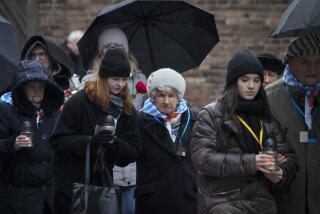Kohl’s Visit Spotlights Disputed Polish Regions : East Bloc: Ethnic Germans turn the event into a display of residual nationalism.
- Share via
KRZYZOWA, Poland — About 8,000 ethnic Germans waving banners demanding minority rights cheered West German Chancellor Helmut Kohl on Sunday as he visited a corner of Poland that was German territory before 1945.
The public display of national fervor by Poland’s German community was unprecedented since Poland absorbed eastern German provinces after Nazi Germany’s defeat in World War II.
Kohl and Polish Prime Minister Tadeusz Mazowiecki attended a bilingual, open-air Mass in this village, known in German as Kreisau, to symbolize improved bilateral relations after decades of tension over ethnic and frontier disputes.
But the spectacle of ethnic Germans joyfully mobbing Kohl as he arrived for the Mass and imploring him to press their case for official minority status turned the event into a forum for residual German nationalism in Poland.
One-third of all current Polish territory was German before the war. Polish-German relations in the regions have been strained since the Nazi invasion in 1939.
Millions of Germans were expelled when the regions were awarded to Poland after the war, and estimates of the number of ethnic Germans remaining range from 80,000 up to 1 million, mainly in Silesia and East Prussia. The displaced Germans remain a strong political force in West Germany.
Poland has long denied the presence of ethnic Germans, many of whom speak better Polish than German. But the Solidarity-led government that replaced Communist rule in September is drawing up a law on minority rights.
Banners declaring “We Want German Language Schools and Church Services” and “Helmut, You’re Our Chancellor Too” fluttered above the throng that crammed a square in this southwestern Polish town for the Mass.
The crowd also waved German flags and chanted “Helmut! Helmut!” as he shook countless hands, accepted flowers and hoisted aloft a little girl wearing the traditional costume of Silesia.
And, reflecting the new Solidarity-led government’s popularity, some also called out Mazowiecki’s name.
West Germany has long pressed Poland to allow German schooling, religious services and cultural activities for the ethnic Germans.
Despite the pro-German banners, Kohl said the Mass accomplished its purpose of bringing together West Germans and Poles. An estimated 6 million Poles died in the Nazi occupation.
“We have exchanged reconciliation with each other. We said to one another “God bless you and God bless your people,’ ” Kohl said in brief remarks to the gathering after the Mass.
Mazowiecki said: “We attended this Mass in the spirit of brotherhood. We are bound to this brotherhood and obliged to those who used to gather here.”
Krzyzowa, an old Silesian community about 225 miles southwest of Warsaw, was chosen for the Mass to honor a German nobleman, Count Helmuth James von Moltke, who founded an anti-Nazi resistance group here.
The Nazis executed Von Moltke in 1945 for taking part in a plot to assassinate Adolf Hitler. Von Moltke’s crumbling old mansion is to be made into a monument to the anti-Nazi underground under a recent Polish-West German accord.
Swayed by West Germany’s Silesian exile community, which has never recognized Polish sovereignty in their old homeland, Kohl originally wanted the Mass to be held at St. Anne’s Hill, a rallying point for Poland’s ethnic Germans.
But Mazowiecki refused to allow a pilgrimage to a place where Silesian Germans crushed a Polish rebellion in 1921. Kohl then settled on Krzyzowa as a compromise.
Kohl’s journey to Krzyzowa was his first public appearance since returning to Warsaw on Saturday. He broke off his tour for 24 hours to fly home for emergency consultations on the political turmoil in East Germany.
Before Kohl interrupted his trip, the two sides signed 11 cooperation agreements Friday, including a West German offer of $1.62 billion in investment credits for Poland’s moribund economy.
More to Read
Sign up for Essential California
The most important California stories and recommendations in your inbox every morning.
You may occasionally receive promotional content from the Los Angeles Times.









